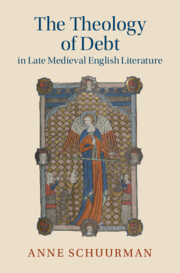Book contents
- The Theology of Debt in Late Medieval English Literature
- Cambridge Studies in Medieval Literature
- The Theology of Debt in Late Medieval English Literature
- Copyright page
- Dedication
- Contents
- Acknowledgements
- Abbreviations
- Introduction
- Chapter 1 Counterfeit Money
- Chapter 2 Secret Debts
- Chapter 3 Home Economics
- Chapter 4 “What is ynogh to mene”
- Chapter 5 Piers Plowman and the Inappropriable
- Epilogue
- Notes
- Bibliography
- Index
- Cambridge Studies in Medieval Literature
Epilogue
Published online by Cambridge University Press: 04 January 2024
- The Theology of Debt in Late Medieval English Literature
- Cambridge Studies in Medieval Literature
- The Theology of Debt in Late Medieval English Literature
- Copyright page
- Dedication
- Contents
- Acknowledgements
- Abbreviations
- Introduction
- Chapter 1 Counterfeit Money
- Chapter 2 Secret Debts
- Chapter 3 Home Economics
- Chapter 4 “What is ynogh to mene”
- Chapter 5 Piers Plowman and the Inappropriable
- Epilogue
- Notes
- Bibliography
- Index
- Cambridge Studies in Medieval Literature
Summary
In this book, I have shown some of the ways in which the penitential and sacramental theology of the later Middle Ages was not resistant to emerging capitalist forms and principles but rather contributed to their emergence, and I have argued that we can identify in medieval theology a distinctly capitalist spirit. This spirit is expressed precisely in those aspects of the “age of faith” that have usually been read as inimical to the market and to the rationalizing, secularizing forces of modernity. Belief in the incarnated Christ is a kind of monetary belief, even as the Redemption is an economic exchange that cannot be reduced to mere metaphor; likewise, the faith and trust on which financial credit relies are aspects of a non-rational, essentially religious belief in the trustworthiness of creditor and debtor alike. The sacramental theology of marriage, encapsulated in the marriage debt, seeks to govern desire in the domestic economy by producing self-governing subjects, subjects who, as Weber and Foucault would remind us, are the prerequisites of capitalism. The penitential practices required to measure vices and virtues, practices taught and modelled by penitential handbooks and by Piers Plowman, suggest the kind of rational, methodical conduct of life that Weber identified with Protestant ascesis, although Langland’s emphasis falls on the paradox of sin as a debt that must be paid but that cannot be paid. Langland’s attempt to imagine a Franciscan form of life in the general economy leads to his affirmation of common use; the final images of Christian communal life in the poem are images of a Pentecostal bureaucracy of labourers who manage the gifts and resources lent by God. In Piers Plowman, Langland makes the case for a monetized, bureaucratized social structure precisely in his desire to eschew covetous materialism. All of these texts exemplify the ways in which theological ideas can shape economic structures and realities; more specifically, they suggest ways in which capitalism as an economy of debt shares conceptual ground with the penitential economy of debt.
- Type
- Chapter
- Information
- The Theology of Debt in Late Medieval English Literature , pp. 172 - 176Publisher: Cambridge University PressPrint publication year: 2024

